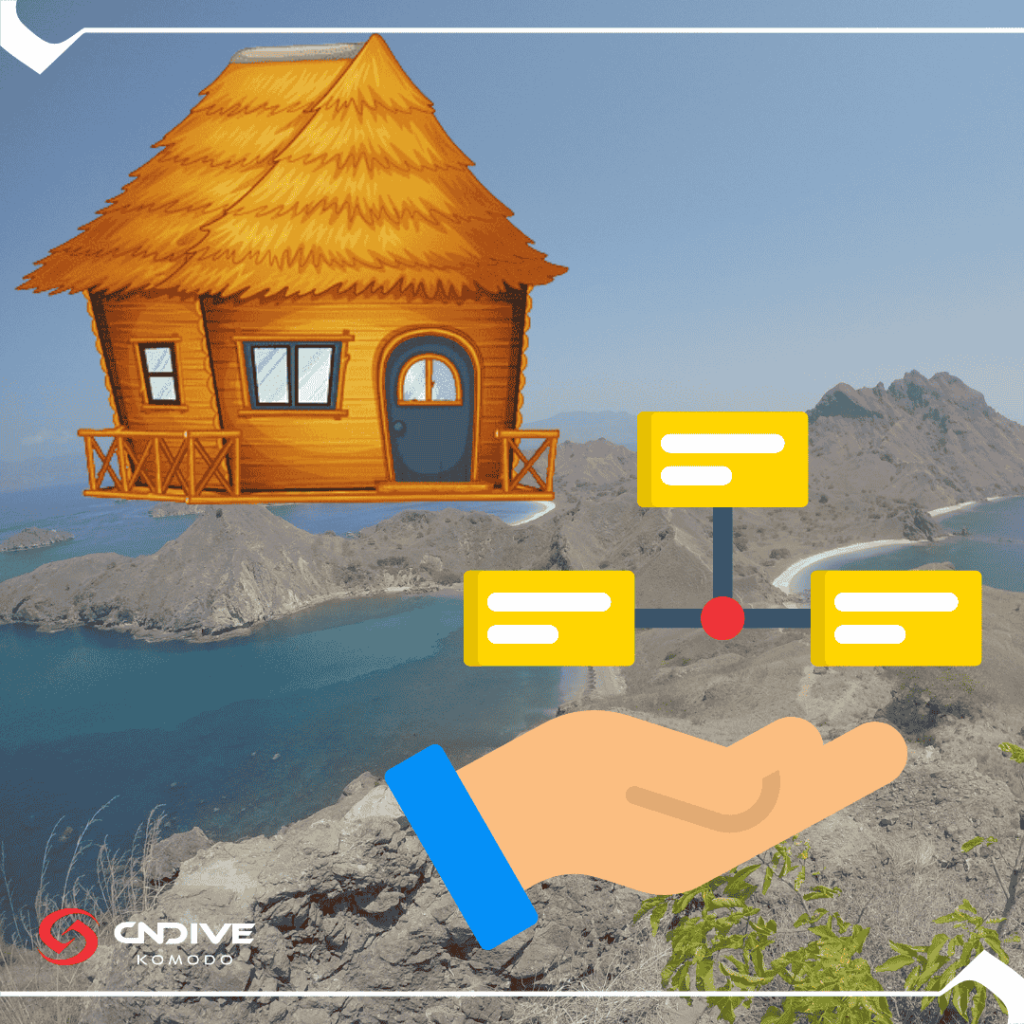
Whatsapp:
+6282138677490
Email: cndivekomodo2@gmail.com
Address:
GV7G+6XP, Jl. Reklamasi Pantai, Labuan Bajo. Kecamatan Komodo, Kab. Manggarai Barat. NTT
Privacy policy
Terms and conditions

Seaside Guesthouse Highlights for Labuan Bajo Diving Escapades
 Labuan Bajo, situated at the western end of Flores Island in Indonesia, serves as the entrance to Komodo National Park. Notably, this region is renowned for its extraordinary marine biodiversity, and consequently, it has become a favored destination for scuba divers worldwide. Moreover, selecting the right seaside guesthouse in Labuan Bajo can significantly influence the quality of your scuba diving holiday. Therefore, this guide delves into the essential factors to consider, the compromises to weigh, and the challenges to overcome when planning a truly memorable diving trip.
Labuan Bajo, situated at the western end of Flores Island in Indonesia, serves as the entrance to Komodo National Park. Notably, this region is renowned for its extraordinary marine biodiversity, and consequently, it has become a favored destination for scuba divers worldwide. Moreover, selecting the right seaside guesthouse in Labuan Bajo can significantly influence the quality of your scuba diving holiday. Therefore, this guide delves into the essential factors to consider, the compromises to weigh, and the challenges to overcome when planning a truly memorable diving trip.
Staying near the harbor or close to prominent dive operators not only saves valuable time but also ensures hassle-free access to Komodo National Park’s dive sites. Additionally, this proximity allows divers to plan their trips more efficiently and minimizes the effort required to reach the best underwater spots. Seaside guesthouses often provide not only convenience but also breathtaking views and quick transfer options. Proximity to the dive sites is especially crucial for early-morning trips or divers who plan multiple dives in a day.
After hours spent underwater, comfort becomes a priority. Opt for guesthouses offering cozy accommodations, reliable air conditioning, and dedicated facilities for divers such as equipment storage and rinse stations. Many divers also value additional features like on-site restaurants, spa services, or communal spaces to unwind after a long day. These amenities can enhance the overall holiday experience.
Labuan Bajo caters to a variety of budgets, ranging from modest guesthouses to luxury seaside resorts. Therefore, balancing costs with the desired level of convenience and comfort becomes a key aspect of decision-making. Moreover, whether you prioritize affordability or indulgence, the diverse options ensure that every traveler can find something suitable. Consequently, thoughtful consideration of these factors can significantly enhance your overall experience. Budget-friendly guesthouses often provide a more authentic local experience, while higher-end options deliver superior services and amenities. Regardless of the price range, it is important to select accommodations that meet your specific needs as a diver.
The Komodo National Park is a delicate ecosystem that requires sustainable tourism practices to thrive. Choosing eco-conscious guesthouses helps preserve the environment while allowing future generations to enjoy its wonders. Look for accommodations that incorporate initiatives such as waste management systems, energy-efficient practices, and partnerships with conservation programs. Moreover, supporting guesthouses that prioritize sustainability not only helps promote eco-friendly practices but also contributes significantly to the broader goals of responsible tourism.
 Choosing the ideal guesthouse often involves making tradeoffs. For instance, a luxurious and tranquil resort located far from town may limit access to local restaurants or nightlife. On the other hand, staying at a budget-friendly guesthouse within the town center might mean forfeiting oceanfront views and a peaceful ambiance. Moreover, divers must also weigh the importance of having on-site facilities against staying close to dive operators. For example, while some guesthouses specifically cater to divers with features like lockers and rinse stations, others, by contrast, aim to appeal to a broader audience, including families or non-diving visitors.
Choosing the ideal guesthouse often involves making tradeoffs. For instance, a luxurious and tranquil resort located far from town may limit access to local restaurants or nightlife. On the other hand, staying at a budget-friendly guesthouse within the town center might mean forfeiting oceanfront views and a peaceful ambiance. Moreover, divers must also weigh the importance of having on-site facilities against staying close to dive operators. For example, while some guesthouses specifically cater to divers with features like lockers and rinse stations, others, by contrast, aim to appeal to a broader audience, including families or non-diving visitors.
Planning a scuba diving holiday comes with its unique set of challenges. Divers often face the dilemma of balancing time, money, and preferences to craft the perfect trip. Understanding these challenges can help travelers make informed decisions.
Labuan Bajo has grown in popularity, leading to high demand for seaside accommodations, particularly during peak seasons. Early booking is crucial to secure your preferred guesthouse and avoid last-minute stress.
The region’s weather significantly affects diving conditions. Researching the best seasons for diving in Komodo National Park ensures an optimal experience. Guesthouses closer to dive operators may provide real-time updates on conditions and tides, offering added convenience.
Not every guesthouse will perfectly match expectations. It is essential to research reviews, compare options, and prioritize features that matter most to you. For example, a guesthouse with fewer amenities may offer exceptional customer service and personalized attention, compensating for its limitations.
Utilize online resources such as travel websites, forums, and social media platforms to read reviews and compare accommodations. Pay attention to feedback from fellow divers, as their insights are often the most relevant.
Make a list of must-have features and rank them by importance. Whether it’s proximity to dive sites, environmental practices, or affordability, understanding your priorities simplifies decision-making.
Given Labuan Bajo’s popularity, booking your guesthouse well in advance increases the chances of securing your desired option. Early planning also allows for better budgeting and eliminates unnecessary stress.
Reach out to guesthouses to clarify details about their facilities, policies, and packages. Asking specific questions ensures that your expectations align with what they offer. This step can help you avoid surprises and foster a smoother experience.
Staying in a guesthouse that supports local communities can enrich your trip. Many accommodations collaborate with local businesses, offering authentic cultural experiences and contributing to the region’s economy.
While diving is the main attraction, Labuan Bajo has much more to offer. Visiting local markets, tasting traditional cuisine, or embarking on a trek to nearby hills can add variety to your holiday.
Responsible diving practices ensure the preservation of marine life and coral reefs. Follow guidelines provided by dive operators and respect the underwater environment. Many guesthouses partner with organizations that promote responsible diving, making it easier for visitors to contribute to conservation efforts.
Planning a scuba diving holiday, especially to a popular destination like Labuan Bajo, can be an exhilarating experience. However, several challenges often arise, requiring careful attention and strategic planning. This article delves into these challenges and provides valuable insights on how to tackle them effectively.
Labuan Bajo, renowned for its breathtaking marine biodiversity and pristine waters, has become a magnet for scuba diving enthusiasts worldwide. The peak diving season, which spans from April to November, sees a significant influx of tourists. As a result, securing accommodations and diving slots becomes increasingly challenging during this period. To avoid disappointment, travelers must book their trips well in advance. Moreover, flexibility in travel dates can increase the likelihood of finding suitable options, especially for those planning last-minute visits.
Organizing a scuba diving holiday often involves balancing the preferences of a group. While some individuals may be passionate about diving, others might prioritize leisure activities like island-hopping, exploring cultural landmarks, or relaxing on beaches. This diversity of interests can complicate itinerary planning. To address this, creating a flexible schedule that incorporates both diving adventures and land-based activities is essential. Additionally, open communication among group members helps ensure everyone’s expectations are aligned.
Weather is a key factor in determining the success of a scuba diving holiday. Factors such as underwater visibility, currents, and sea conditions are heavily influenced by seasonal weather patterns. In Labuan Bajo, the dry season (April to November) typically offers the best diving conditions, with calm waters and excellent visibility. However, divers should remain informed about specific weather forecasts and be prepared for occasional variations. Consulting local diving operators and monitoring weather updates can enhance the overall experience and ensure safety.
Budgeting for a scuba diving trip involves more than just factoring in travel and accommodation costs. Diving equipment rentals, guided tours, park entry fees, and transportation to dive sites can significantly impact the overall expenses. Travelers should research and compare prices for various service providers to find options that suit their budget. Additionally, opting for package deals that bundle accommodations, meals, and diving activities can often result in cost savings.
Engaging in scuba diving requires a certain level of physical fitness and adherence to safety protocols. Potential health challenges, such as decompression sickness, barotrauma, or fatigue, can arise if precautions are not taken. Travelers must undergo medical checkups before their trip to ensure they are fit for diving. Moreover, choosing reputable diving operators who prioritize safety and offer well-maintained equipment is essential.
For international travelers, language barriers and unfamiliar cultural practices may pose minor challenges. In Labuan Bajo, while English is commonly spoken in tourist areas, some local communities primarily use their native languages. Learning a few basic phrases in the local language and being respectful of cultural norms can greatly enhance interactions and experiences.
The pristine marine ecosystems around Labuan Bajo are increasingly under threat due to tourism-related activities. Divers must adopt sustainable practices to minimize their impact on the environment. This includes avoiding contact with marine life, refraining from touching coral reefs, and using reef-safe sunscreen. Supporting eco-friendly dive operators and participating in conservation initiatives further contributes to the preservation of these ecosystems.
In remote areas like Labuan Bajo, reliable internet connectivity may not always be available. Travelers who rely on digital maps, online bookings, or social media updates should plan for limited access to technology. Downloading offline maps, confirming bookings in advance, and carrying physical copies of essential documents can mitigate potential disruptions.
Despite meticulous planning, unforeseen situations such as flight delays, equipment malfunctions, or adverse weather conditions can disrupt a trip. Building flexibility into the itinerary and having contingency plans can help travelers adapt to these challenges. Travel insurance that covers diving-related incidents and trip interruptions is highly recommended to safeguard against financial losses.
Komodo National Park is a UNESCO World Heritage Site, famous for its breathtaking marine biodiversity and the iconic Komodo dragons. Situated in Indonesia, this park attracts adventurers and scuba diving enthusiasts from around the globe. Its crystal-clear waters and vibrant coral reefs make it one of the world’s most sought-after diving destinations. However, maintaining this paradise requires collective efforts toward sustainable tourism. Choosing eco-conscious accommodations and activities can significantly influence the preservation of this unique environment.
This park is home to over 1,000 species of fish, 260 species of coral, and 14 species of whales, dolphins, and sea turtles. The park’s diverse ecosystems include mangroves, seagrass beds, and coral reefs, which support an incredible variety of marine life. The surrounding islands are equally spectacular, offering rugged landscapes and a chance to witness the Komodo dragon in its natural habitat.
As visitors, our role in protecting this UNESCO site cannot be overstated. Scuba diving in Komodo National Park allows travelers to experience its beauty firsthand. However, it also emphasizes the importance of preserving marine ecosystems. Without proper care, coral bleaching, overfishing, and habitat destruction could jeopardize this marine haven.
Your choice of accommodation can significantly impact the park’s environment and the local economy. Supporting eco-friendly guesthouses ensures that tourism benefits the region without harming its ecosystems. Many sustainable lodges and resorts prioritize renewable energy, waste management, and water conservation. For instance, some properties rely on solar panels and ban single-use plastics, demonstrating a commitment to reducing their environmental footprint.
Moreover, staying in locally owned guesthouses supports the livelihoods of communities that depend on tourism. These accommodations often collaborate with marine conservation organizations, further contributing to the park’s preservation. By prioritizing such establishments, you can enjoy a fulfilling trip while promoting sustainable practices.
Komodo’s dive sites are renowned for their diversity. From Manta Point, where divers encounter majestic manta rays, to Castle Rock, teeming with reef sharks and vibrant fish, the underwater experiences are unparalleled. However, responsible diving is essential to protect these fragile ecosystems.
To minimize your impact, choose dive operators that follow environmentally friendly practices. Ethical operators brief divers on proper techniques, such as maintaining buoyancy to avoid damaging corals. They also ensure that boats use mooring buoys instead of anchors, which can harm the reef. Additionally, participating in programs like reef cleanups can help mitigate pollution while enriching your diving experience.
Sustainable tourism extends beyond individual choices. Engaging in marine conservation initiatives strengthens efforts to preserve Komodo National Park. Many organizations conduct research, monitor coral health, and rehabilitate damaged reefs. By volunteering or donating to these groups, you contribute to their vital work.
Programs that educate locals and visitors about the importance of marine protection are equally impactful. Workshops, guided eco-tours, and interactive sessions foster a deeper appreciation for the environment. As more people understand the significance of preserving Komodo’s resources, the collective effort to protect it grows stronger.
When discussing sustainability, clear communication is crucial. Transition words like “therefore,” “however,” “moreover,” and “in addition” help convey ideas effectively, guiding readers through complex topics. For instance, “moreover,” highlights the interconnectedness of tourism, conservation, and community well-being. Meanwhile, “however” acknowledges challenges and emphasizes the importance of proactive measures. By integrating such words into your writing, you enhance its coherence and readability.
Komodo National Park is part of the Coral Triangle, a region celebrated for its unparalleled marine biodiversity. This area, spanning six countries, supports the highest coral diversity on the planet. Protecting Komodo is vital for the broader health of the Coral Triangle, as threats like climate change and pollution transcend borders.
To address these challenges, collaborative efforts among governments, non-profits, and tourists are essential. Supporting initiatives that combat illegal fishing and promote sustainable seafood choices strengthens the resilience of marine ecosystems. These actions not only protect Komodo but also contribute to the global fight against marine degradation.
Creating a sustainable itinerary requires thoughtful planning. Begin by researching eco-conscious operators and accommodations. Many online platforms provide information on certified sustainable tourism providers. Additionally, review guidelines for responsible travel to minimize your environmental impact.
Packing wisely is another important step. Bring reusable items like water bottles, straws, and tote bags to reduce waste. Opt for reef-safe sunscreen to prevent chemical damage to corals. Small changes in your preparations can lead to significant positive outcomes.
When booking activities, prioritize operators that offer educational experiences. Guided tours led by marine biologists or local experts enhance your understanding of Komodo’s ecosystems. Such experiences deepen your connection to the environment, making your trip both enjoyable and meaningful.
Sustainability isn’t limited to environmental practices—it also involves respecting local cultures. Komodo’s communities have a rich heritage shaped by their connection to the sea. Interacting with local communities and exploring their traditions cultivates mutual respect and understanding.
Participating in cultural exchanges, purchasing locally crafted souvenirs, and dining at family-run eateries support the community’s economy. These interactions also provide insights into the challenges locals face in balancing conservation and livelihood. By showing respect for their way of life, tourists become allies in the quest for sustainability.
To gauge the success of your sustainable holiday, reflect on its outcomes. Did you contribute to the local economy? Were your choices environmentally friendly? Assessing these aspects helps identify areas for improvement in future travels.
Sharing your experiences can also inspire others. By highlighting the benefits of sustainable tourism, you encourage fellow travelers to adopt eco-conscious practices. Together, individual actions can drive significant change, ensuring that Komodo National Park remains a treasure for generations to come.
Sustainable tourism is a continuous journey. Visiting Komodo National Park responsibly is just the beginning. Advocate for environmental protection, support conservation efforts, and remain mindful of your impact wherever you travel.
By embracing these principles, we can protect Komodo’s extraordinary beauty while enjoying its wonders. Every visitor holds the potential to create an impact.
Here’s the revised paragraph with added transition words for smoother flow:
Planning a scuba diving holiday in Labuan Bajo requires careful preparation to balance comfort, budget, accessibility, and environmental responsibility. To begin with, choosing the right guesthouse near the sea can significantly enhance your experience, particularly when you prioritize proximity, amenities, and sustainability. Furthermore, taking the time to tailor your holiday by researching accommodations that align with your preferences is essential. By booking early, you can avoid disappointment and secure a spot that meets your needs.
In addition, Labuan Bajo offers a variety of options, which means travelers have ample opportunity to find suitable stays that balance quality and environmental ethics. On top of that, diving holidays in this region require attention to safety, group dynamics, and flexible planning. Moreover, adopting responsible travel practices ensures you contribute positively to preserving the natural beauty of Komodo National Park while enjoying its stunning marine biodiversity.
Ultimately, by putting effort into thoughtful planning and considering these aspects, you can look forward to a seamless and memorable adventure in one of the world’s most captivating underwater destinations.

Whatsapp:
+6282138677490
Email: cndivekomodo2@gmail.com
Address:
GV7G+6XP, Jl. Reklamasi Pantai, Labuan Bajo. Kecamatan Komodo, Kab. Manggarai Barat. NTT
Privacy policy
Terms and conditions